No Wonder the Economy Has Trump Spooked

Despite gyrations on Wall Street this week and an associated rise in recession fears, Donald Trump is still ballyhooing the state of the U.S. economy. In private, however, the President sounded “nervous and apprehensive” when he called a number of business leaders and financiers from his New Jersey golf club to ask them about the state of the economy, the Washington Post reported.
Small wonder. With his personal-approval ratings stuck in the low forties, Trump’s 2020 reëlection campaign hinges on a healthy economy. He can be pretty confident that his core supporters will turn out for him, but he also needs to win over some less committed voters. His pitch to them is one that the British Conservative Party used successfully in 2015, during a general election, when it talked up the U.K. economy and issued dire warnings about the consequences of a victory for the opposition Labour Party.
One of the Conservatives’ campaign slogans was “DON’T LET LABOUR WRECK IT.” Substitute “THE DEMOCRATS” for “LABOUR” and you have Trump’s campaign strategy in a nutshell. Addressing a campaign rally in New Hampshire on Thursday night, he portrayed the Democratic candidates for President as “a bunch of socialists or communists” and asked the crowd, “Does anybody want to pay a ninety-five-per-cent tax?” He also suggested that a Democratic victory would lead to a crash in the stock market, adding, “You have no choice but to vote for me, because your 401(k), everything is going to be down the tubes. Whether you love me or hate me, you have got to vote for me.”
The mere fact that Trump’s strategy is based on scaremongering (under Barack Obama, the Dow more than doubled) and outright lies (Joe Biden is a socialist?) doesn’t mean that it can’t work. In 2015, the British economy wasn’t doing great at all. Held back by five years of Conservative austerity policies, it hadn’t even fully recovered from the Great Recession. But the Conservatives, aided by their allies in the British media, managed to raise enough doubts about Labour’s economic competence to gain an over-all majority in the House of Commons. As long as the U.S. economy looks strong, the possibility of something similar happening in November, 2020, can’t be ruled out entirely, despite Trump’s unpopularity.
But, if the economy turns south between now and the election, Trump will almost certainly be defeated, and he knows it. Hence his delay, earlier this week, on expanding tariffs on Chinese imports, and his increasingly frantic efforts to scapegoat the Federal Reserve and its chairman, Jerome Powell. As the Dow plunged on Wednesday, Trump took to Twitter, calling Powell “clueless” and retweeting guests on Fox Business who were criticizing the Fed’s recent policy moves.
In the two days since the big fall in the stock market, we’ve received some new economic data, and it has been mixed. On Thursday, the Commerce Department reported that retail sales expanded by 0.7 per cent in July, the strongest figure since March. Economists responded by raising their estimates of third-quarter G.D.P. growth to about two per cent. That’s a long way short of the four-per-cent growth that Trump promised, but it’s also well above recession levels.
At the same time, the Fed confirmed that the manufacturing sector is in a slump. Manufacturing output fell 0.4 per cent in July, the central bank said, and it is now about 1.5 per cent below its December, 2018, level. For a President who promised to restore manufacturing to its former position of prominence, that can hardly be reassuring. Neither can the news, on Friday, that the University of Michigan’s survey-based index of consumer confidence fell sharply in August, reaching its lowest level since 2016.
The fall raised concerns about whether strong consumer spending will continue to underpin the economy, and it also illustrated that Trump’s aggressive tactics in the trade war are backfiring. “Consumers strongly reacted to the proposed September increase in tariffs on Chinese imports, spontaneously cited by 33% of all consumers in early August,” Richard Curtin, the chief economist at the Michigan survey, noted. The White House has now postponed the higher tariffs until December. That may reassure some consumers, but this week’s fluctuations in the stock market are likely to add to their jitters.
To be sure, none of this means that a recession is imminent. Most economists are predicting that the G.D.P. will continue to rise, albeit at a modest pace. Citing continued growth in jobs and household incomes, Curtain said “it is likely that consumers will reduce their pace of spending while keeping the economy out of recession at least through mid 2020.” The most recent statements from the Fed indicate that it agrees with this assessment.
As I pointed out a couple of days ago, though, economic predictions are often wrong, and nobody can be sure where things are heading. On Wall Street, there is a wide range of opinions, but there is also a general agreement that the risks of a serious downturn are rising. Ray Dalio, the head of Bridgewater Associates, the world’s largest hedge fund, said, on Wednesday, that there is a forty-per-cent chance of a recession before the election.
Despite all his bluster, Trump seems spooked. According to the Washington Post report, he has been “telling some confidants that he distrusts statistics he sees reported in the news media and that he suspects many economists and other forecasters are presenting biased data to thwart his reelection.” These sound like the ravings of an egomaniac who sees the world closing in on him.
DMT.NEWS
via https://www.DMT.NEWS
John Cassidy, BruceDayne
